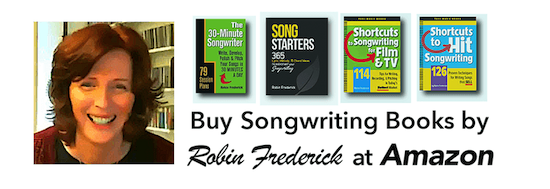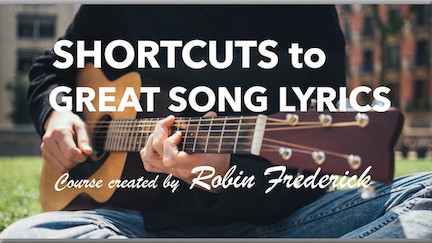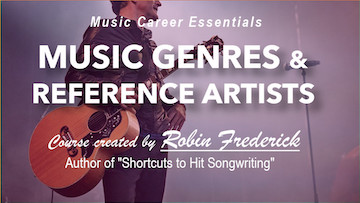If you’re an artist, band, or songwriter, “authenticity” is an important idea. Yet it’s a concept that’s hard to define. What does it mean to be “authentic”? I’ve heard this word tossed around for many years in the music business, but when I ask what it means I get puzzled looks and vague answers.
For music publishers, film & TV music supervisors, and record labels the answer often boils down to “I know it when I hear it.” But as music creators, we need to know more. What does the search for authenticity mean for us? Is it possible to define it for ourselves?
What authenticity isn’t
Because authenticity is so easily misunderstood, let’s start with what it isn’t.
It isn’t your habits: It’s tempting to confuse an “authentic” song or artwork with the first idea that comes into your head. If you don’t have to make an effort to think of it, then it must be natural, right? Not really.
The first thing that occurs to you may feel “natural” because it was effortless but it may really be the habitual thing that occurs to you. Like all habits, you don’t have to think about it – it just happens. But it’s no more authentically “you” than brushing your teeth a certain way or taking the usual route to work.
It doesn’t mean always sticking to the facts: Authenticity does not mean you have to be factually accurate or fill listeners in on every detail of what happened to you. We all write about our personal experiences. The important thing is to get down to the universal emotions and timeless lessons beneath the facts of what happened.
Take a look at Bruce Springsteen’s songs on his legendary album “Darkness On the Edge of Town.” I’m going to use Bruce Springsteen as an example because I think most people agree that he is a truly authentic artist. To express his feelings of alienation and rebellion, he created a portrait of a classic American outsider, drawing on films such as East of Eden and Rebel Without a Cause. He’s writing about his own feelings but not necessarily the facts of his own life.
It doesn’t mean writing in a vacuum: Finally, authenticity doesn’t mean you have to completely reinvent the craft of songwriting by yourself. It’s okay to learn from other writers; in fact, you must learn from good writers. There isn’t enough time in anyone’s career to rediscover what others have discovered before you. And why do it? If you were designing a car, would you reinvent the wheel?
What authenticity is…
So, now that we know what authenticity isn’t, what is it? Essentially, authenticity comes down to three things.
1. Taking risks
It’s a risk to show your vulnerabilities, your feelings. It’s a risk to try something you’re not sure will work. To grow and learn we need to take risks, even if it means failing. Authenticity is not a static thing, it’s all about growing! But you don’t need to jump into the deep end of the pool before you can swim. Take your time. Take measured steps. Just don’t stand still doing the same thing over and over!
2. Expressing a theme or idea in a way that is unique and honest
No two people are the same. Even twins don’t think exactly alike. You have your own ways of seeing and thinking about things. It takes honesty, courage, and some hard work to really get to know yourself. What are the themes and characters that resonate for you? What kinds of books do you like to read? What films? Why do you like them? What are the ideas and characters they deal with? These must connect with something inside of you or you wouldn’t find them so compelling.
Many writers keep a daily journal in which they write down their observations and feelings. Try digging below the surface, look for words that describe the way you think and feel. There are books on journal keeping that can help you make good use of this technique. A quick search at Amazon will turn up several. Choose one that sounds right for you.
3. Communicating with listeners effectively and personally
Being authentically YOU doesn’t mean sealing yourself in an ivory tower. How you define yourself has a lot to do with how you relate to others. If you write lyrics that are so dense, poetic, and personal that no one else can understand them, it doesn’t mean that you’re being more authentic than someone who writes simple, conversational lyrics everyone can relate to. You need to find the songwriting voice that communicates with others and, at the same time, expresses your ideas, images, and emotions.
Learn how to keep your listener involved in your song.
Check out songs by John Mayer, Ingrid Michaelson, The Script, Christina Perri, Mumford and Sons, Fleet Foxes. These artists write honest, revealing songs that connect with listeners. If you love the music of Bruce Springsteen, study the way he uses images to paint a picture in the listener’s mind. And how he uses melody, chords, and vocal performance to underscore the emotion he wants to put across.
Song Craft and Authenticity
So how do you square being emotionally honest and still use the techniques of song craft? If you’re being “crafty” doesn’t that mean you are somehow being less authentic? Not at all… because craft exists to support your emotions and ideas, not replace them. Use song craft to make sure listeners understand what you’re saying and feel what you’re feeling. Techniques like melodic contrast, dynamic build, lyric imagery, and song structure exist because they help songwriters communicate more effectively. They’re not an end in themselves.
There is nothing in the craft of songwriting that changes what you authentically think or feel! Using a song form with a chorus doesn’t change what you’re saying, only the form in which you’re saying it. Whether water is flowing in a stream or poured into a glass, it’s still water! Be water – fill up the space you are given while remaining true to yourself.
Why is authenticity important?
Aside from the fact that it just sounds like something we ought to be—I mean, no one wants to be thought of as a fake!—authenticity is something that affects every aspect of writing and performing. Every decision you make about a line in a song or your stage performance is based on telling others what you honestly feel and think in a way they can hear and relate to.
This means you need to have a good idea of who you are and how to communicate that to your listeners. Watch your own reactions, be aware of what moves you. Ask yourself why you feel the way you do. Keep a list of words, phrases, and images that have emotional power for you. Keep adding to that list. Use it to build themes.
Are hit songs authentic?
Many songwriters criticize hit songs for being shallow and therefore inauthentic. But a song can be about something simple – like having a good time – and still be believable. Jason Mraz, The Black Eyed Peas, Katy Perry, Fun., and LMFAO are examples of artists and bands who write songs with an infectious, feel-good vibe that is both honest and believable, as well as entertaining. Don’t confuse misery with honesty. We all have a range of authentic feelings; try exploring every side.
Listen and read along as I show you what makes “I’m Yours” by Jason Mraz so successful.
Sure, there are some hit songs that are less than stellar. Maybe that artist has millions of fans just waiting to pounce on their latest release. Let those go by. YOU should look for successful songs that move you and study those to pick up contemporary techniques you can blend with your own ideas to create something that moves today’s listeners.
Practice authenticity
It may seem strange to suggest that you can practice something like authenticity – something that seems like it should come naturally, but it’s actually, as author Brene Brown says, a series of choices we make in everything we do. Bruce Springsteen wrote 70 songs for his album Darkness on the Edge of Town. 50 were recorded by the band. Only 10 made it onto the album. He made his choices!
To make those choices yourself, you need to be aware of who you are and how you relate to the world. Being a songwriter doesn’t stop when you put down your guitar or walk away from the keyboard. It’s woven into everything you do. Be aware of your reactions, emotions, and relationships at home or at work.
Notice other people. What’s their emotional “story”? How would you describe it so a stranger could understand and feel the same things you do? Keep a notebook and write down your thoughts. Later on, try expanding them into a larger work while maintaining the honesty of your observations. Being an artist isn’t always easy, but it’s always worth doing when you’re writing from your authentic self!
by Robin Frederick



